Rockin’ (almost) all over the world
Time for another of the one hit blunders:
Acts that stormed the Billboard Hot 100 one time only, before being unfairly discarded by America.
Meaning: You in the States missed out on rich and diverse back catalogues. This time:
Status Quo
The UK Chart Record:

- Singles:
Top 40 = 57
Top 10 = 22
#1 = 1 - Albums:
Top 40 = 43
Top 10 =25
#1 = 4

Or, “The Quo.” as they’re also known by:
A US one hit wonder par excellence when it comes to this one shot masking success in other territories.
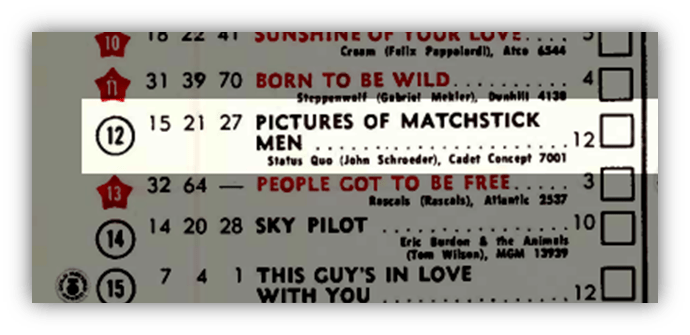
In the US, “Pictures Of Matchstick Men” reached #12 in 1968.
Their other Hot 100 entry was follow up “Ice In The Sun” at #70.*“

*If it didn’t make the Top 40, it doesn’t count.
One hit status: preserved.
By contrast, their UK achievements include:
- More hit singles than any other band with top 40 entries every decade from ’60s to ’10s.
- Top 40 albums every decade from ’70s to ’20s. Second only to The Rolling Stones for hit albums by a group.
One of the top 10 biggest selling bands for singles and albums in the UK.
Even better for contrast is that the American chart entries feature a psychedelic sound that they would soon jettison. Their trademark sound saw them renowned / disparaged for doing the same thing over and over.
You know what you’re getting with Status Quo.
No experimenting, no adornments, no disco phase, no new wave influences, no deviation from the path.

They hammered home the same three chords into catchy 12 bar blues boogie rock.
Even in the 70s, they were criticised for the simplistic nature of their music. If you weren’t a fan, it was a stick to beat them with. On the other hand: look at their achievements. Don’t knock it. It worked for them.
The story started in 1962:
Schoolmates Francis Rossi (vocals and lead guitar) and Alan Lancaster (bass and vocals) formed The Paladins.

John Coghlan (drums) joined a year later.

Rick Parfitt (rhythm guitar and vocals) completed the line up in 1967 and having gone through several name changes, they landed on Status Quo.
Writing and lead vocals were shared amongst the front three with Rossi generally the focal point.
He later admitted the psychedelic sound they initially copied wasn’t a natural fit; for one thing, they were too scared to try the drugs associated with the scene Ironic given the appetite for cocaine they would go on to develop.

Commercial fortunes waned with a second psychedelic album.
The next two albums saw them moving towards a better fit with a harder, blues infused sound.
1973’s Piledriver, their fifth studio album, perfected this and brought them top 10 single and album success.
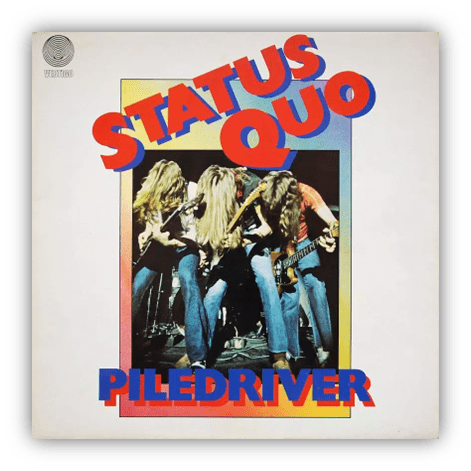
The cover featured Rossi, Parfitt and Lancaster in headshaking hairflying unison, a look that would become synonymous with Quo.
They were never metal.

But they did achieve probably the hardest rocking #1 of the 70s in 1974’s “Down Down.”
In 1977 they released the Rockin’ All Over The World album.
The title track became their signature song.
I was well into adulthood before I realised it was a cover. The John Fogerty original wasn’t a hit here, whereas Quo’s became ubiquitous. Less earthy than Fogerty, they gave it the Quo treatment:

Louder and more anthemic.
A further element of their success was their work ethic. New studio albums every year from 1968 to 1983 and constant touring to accompany them.
It would unravel in the 80s. Increasing coke and alcohol consumption took its toll, exacerbating personal tensions. John Coghlan left in 1981 with Lancaster saying Rossi had forced him out.
A bigger schism opened in 1983.
They recorded two versions of the Lancaster penned “Ol’ Rag Blues,” one with him on lead vocals, the other with Rossi. The record company chose to release Rossi’s version.
This didn’t sit well with Lancaster who was also unhappy with the quality of the Back To Back album.

He moved to Australia at this time, not exactly conducive to a close working relationship. The others reacted to his absence by performing on TV with a cardboard cutout in his place.
It looked like the end of the road. They announced the 1984 tour would be their last.
Then came Live Aid.
Bob Geldof convinced them to play.

For the organisers, “Rockin’ All Over The World” was the perfect lead off.
Alan Lancaster even showed up.
As with many rock stars, especially ones indulging in heavy substance abuse they may be unreliable narrators of their own career. I found one interview where they claimed there was much backstage arguing about who would go on first.
Quo cut through the crap and heroically stepped up.

An account that supposes the organisers didn’t bother with a running order and left it to the acts to decide amongst themselves.
Unlikely.
Especially as Rossi and Parfitt would also say they were so coked up they hardly knew what they were doing on stage.
How Quo Mark 2 came about is also cloudy.
In one account, Rossi said that playing Live Aid reinvigorated them, he and Rick realising how much the band meant to them and putting differences aside. Another is that he was strongarmed into it by the label.
In this version Rossi was told they were contracted to make three more albums and he was on the hook for them. With excessive alcohol and coke habits to cover and ailing finances they carried on.
Whichever is true, they did not want Lancaster involved.

His response was an injunction to stop them using the Status Quo name. The case was settled out of court with Rossi and Parfitt retaining the rights.
In other interviews, Rossi has said he wasn’t inspired by the prospect of carrying on. Parfitt became more of a passenger, and having been close initially, from the early 80s relations between the two would remain difficult for the rest of their career.
This was hidden by the public facade of Rossi and Parfitt being as close as brothers.

Rossi remained very much the driving force with Parfitt barely present in the recording process the longer the band went on.
The new Quo made some adjustments. Lancaster had been a hard rock fan and without him they toned that down.
They filled out the line up with new recruits who also up picked up writing duties with Rossi.

One of those recruits, bassist John ‘Rhino’ Edwards.
He had previously done time in the ever revolving cast of Dexys Midnight Runners during the Too-Rye-Ay era.
Dexys and Quo certainly aren’t musically aligned, but that’s the life of a jobbing musician. Edwards tenure with Quo ended up considerably longer, almost 30 years.

In The Army Now got the new band off to a fast start in 1986 with a #2 placing.
There was one further late 80s big hit in “Burning Bridges.”
Much more lightweight than their heyday but maintaining the chugging rhythm at its core.

The 90s weren’t great. The decade was more about keeping their name in the public eye through any means rather than through the quality of their music.
There was a brief commercial highpoint in 1990 with their final top 10 single, “The Anniversary Waltz – Part One.” It marked 25 years from Francis and Rick meeting.

Detractors would refer to it as Jive Bunny with guitars, being a medley of songs from the 50s to 70s.
It provided the short term boost of a #2 hit, but being accused of copying Jive Bunny did nothing for long term credibility. Especially when it was followed by “Part 2” and “Roadhouse Medley (Anniversary Waltz Part 25).”
There would even be another (kind of) #1.
Britain has a history of football teams making records.

In 1994 Manchester United hit #1 with “Come On You Reds” which was based on “Burning Bridges.”
Status Quo weren’t officially credited, but they wrote new lyrics and provided the backing. Again, it maintained their profile if not their credibility.
Then there was the court case.
In 1996 the band brought an action against Radio 1 who had been going through a repositioning towards a younger audience. The late 40 somethings of Status Quo were not part of this vision.
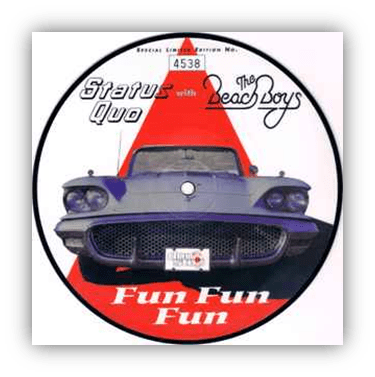
Quo released a cover of “Fun Fun Fun,” featuring the Beach Boys, which entered the charts at #24.
Radio 1 declined to add it to their playlist. The band alleged that Radio 1 had banned the single and that the playlist should be determined by what is in the Top 40 rather than judgements of taste.
It went to the High Court with the judge ruling against the band and cuttingly telling them Radio 1 “regards Status Quo as somewhat conservative and old hat”.

Arguably, the publicity helped Radio 1 more than Status Quo.
The real problem was that the cover of “Fun Fun Fun” was, let’s be kind: inessential. Much stronger opinions are also available. Quo would later say their management drove a lot of the publicity seeking activities.
While chart positions declined they kept going.
In the 00s there were five studio albums and many more tours.

In 2013, with Rossi and Parfitt now into their 60s they made a feature film: Bula Quo!
A comedy caper in which they play themselves.

It’s set in Fiji where they’re on tour and witness a murder leading them to go on the run from a criminal organisation harvesting organs.
No, really.
It did not set the box office alight.
No, really.
In 2013 there was a more positive development as the original four members put differences aside to tour:
Calling themselves The Frantic Four so as not to cause confusion with the ongoing Rossi / Parfitt led band.

Just being in the same room was some achievement, given that music journalist John Harris once described Alan Lancaster as ‘by some distance, the most bitter musician I have ever encountered’.
There were two tours. And despite their success, it would end in more bad blood.
Again, this is shot through with the potentially unreliable narration of the band. Lancaster wanted to take things further and record again which Rossi wouldn’t countenance. He further put the boot in saying that although the tour saw Parfitt happier and more confident than in many years, this masked that Lancaster and Coghlan were no longer upto the job.
Rossi and Parfitt returned to Quo until Parfitt’s death in 2016 at 68.

He had already survived four heart attacks over the last 20 years of his life.
It wasn’t the rock and roll lifestyle that caught up with him. His death was as a result of an infection after undergoing shoulder surgery. Alan Lancaster would pass away in 2021 at 72 due to complications from Multiple Sclerosis.
Despite this, Status Quo endured.
In 2019 the 33rd and final studio album, Backbone, gave them their highest charting album of original material since 1982.
They continued touring til 2024. There’s currently no further dates planned and it looks like they have finally run their course.
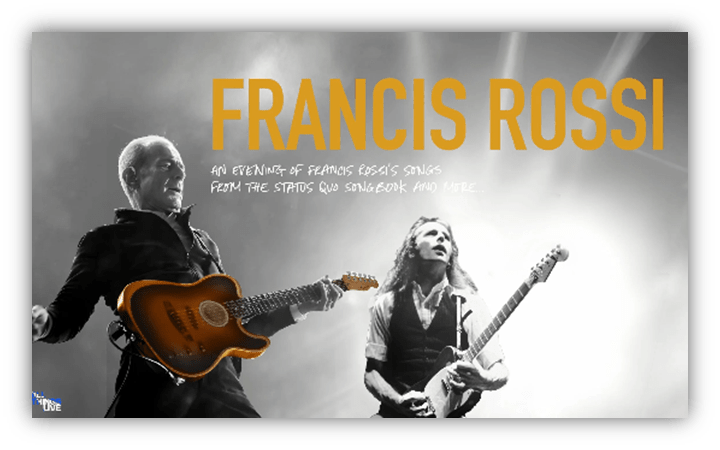
Though Rossi is touring under his own name through to 2026 promising an evening of songs from the Status Quo songbook and more.
In the end, longevity saw a reassessment of their music.
What were once considered weaknesses became lauded as strengths. They overcame adversity (often self inflicted) and were able to bridge genres, performing to huge crowds at Glastonbury in 2009 and the rock / metal festival Download in 2014.
That’s the Quo:

Rockin’ All Over The World.
Just not in North America.








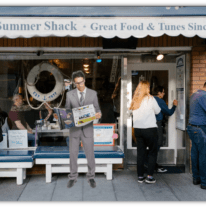
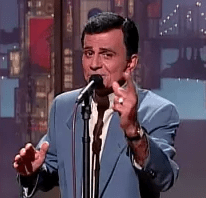
If nothing else, they are true to their name.
Nominative determinism at work. It took them a few albums to grow into it but once they found their sound they were all about maintaining the status quo.
I knew they were bigger in the UK than the US, but 57 Top 40 singles? 43 Top 40 albums? That’s insane.
Guess I need to dig in.
Personally I’d stick to the 70s. I’ve included a few from the 60s and 80s in the playlist for variety and ended it with 1990s Anniversary Waltz. Its far from essential, its pretty terrible in my opinion but I included it to demonstrate the lows.
When it comes to the 90s to 10s output they were a fan only concern. I know they kept turning up in the charts but the material that I did hear didn’t sound great. There may be hidden gems but there’s too many ordinary albums to want to find them.
The reassessment of their legacy was definitely based almost entirely on Quo mark 1s music combined with the longevity of Quo mark 2.
Usually, this synchronicity happens when I’m walking through a grocery store and I’m listening to whatever is playing over the PA system while I’m trying to decide if I need eggs.
This morning, it was during a drive to a meeting.
Atta Quo:
I first became familiar with “Pictures of Matchstick Men” by hearing the Camper Van Beethoven cover with the violin playing the guitar lead line at the break. By the time I heard the original, it was decades after it came out. I loved it instantly. Listened to other stuff by them. Didn’t take. I’ll try again.
If the standard Quo stuff didn’t take try the song Gerdundula. I’ve included it on the playlist. Its from 1970 when they were moving towards the sound they’d perfect on Piledriver. Its like nothing else they recorded, possibly the one and only time they experimented. Has a celtic folk feel (though I’ve seen one review refer to it as Persian trance), there’s no bass or drums and its rather lovely.
Listening to Gerdundula now. I like it. Funny thing is, it’s still basically a blues song, just done very differently.
Also, that picture of an older Parfitt looks exactly how I imagine Owen Wilson will look in a few years.
Some love for Camper Van Beethoven. Oh, my goodness. You’re supposed to suck when you transition to a major label was the common line among indie rock purists in the late-eighties. But those two albums David Lowery recorded for Virgin, Our Beloved Revolutionary Sweetheart and Key Lime Pie, are a quantum leap forward in sound and vision. Sleeper classic indie rock: 1) “Jack Ruby” 2) “Life is Grand” 3) “Sweethearts” 4) “She Divines Water” 5) “Turquoise Jewelry”.
One of my favorite lines ever: “Take off that jumpsuit/You look like Grace Slick,” from “Turquoise Jewelry”. Drives me crazy that “Eye of Fatima” was chosen as the single for Our Beloved Revolutionary Sweetheart.
I got into them a bit from a DJ on Sirius who played them quite a bit. And, of course, I had heard Pictures of Matchstick Men. I really had no idea of how big they were in the UK, though.
One question on pronunciation. Is Status pronounced with a long or short a? The aforementioned DJ always assured us that the British pronunciation was with a long a.
The DJ is right.
When it comes to the phrase status quo I’ve heard it pronounced both ways but for the band its only ever pronounced ‘stay-tus’.
Good to know he was steering us right.
Fantastic post even by your high standards, JJ! Incredible story that I had very little idea about what was involved. Amazing to learn about a group so huge and yet so relatively unknown here in the States.
Very kind. The straightforward nature of their music disguises that there was plenty going on in the background.
I’ve got one more band with an eventful backstory to cover in this series. After that I need to do some digging to find if anyone else fits the brief and has a colourful past.